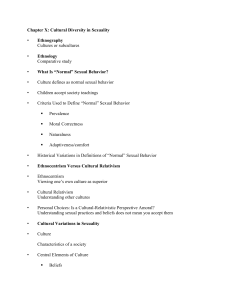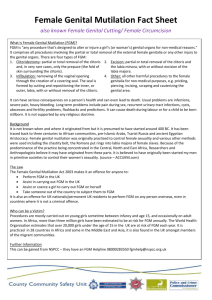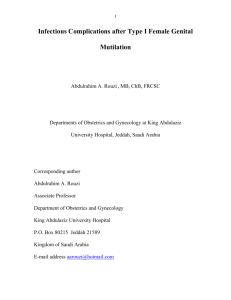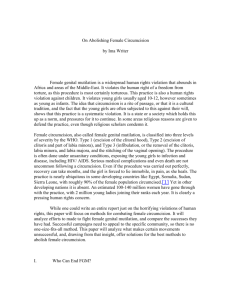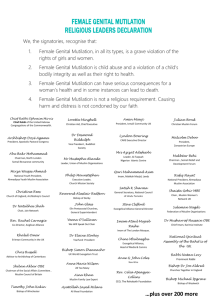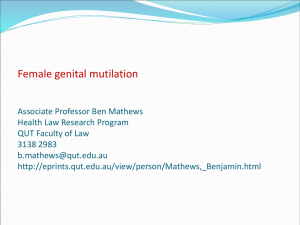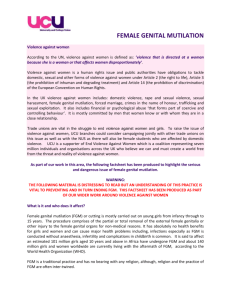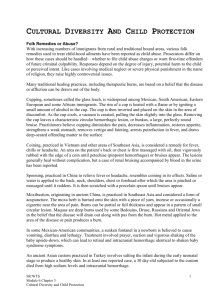Women's Health - Castlemaine District Community Health
advertisement
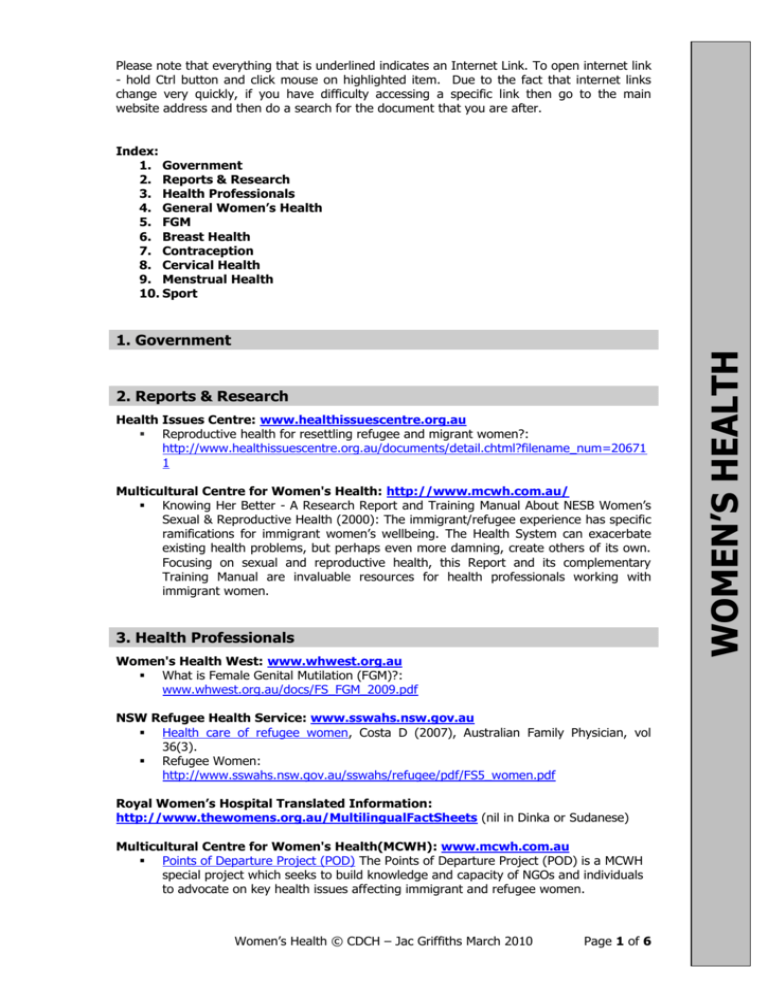
Please note that everything that is underlined indicates an Internet Link. To open internet link - hold Ctrl button and click mouse on highlighted item. Due to the fact that internet links change very quickly, if you have difficulty accessing a specific link then go to the main website address and then do a search for the document that you are after. Index: 1. Government 2. Reports & Research 3. Health Professionals 4. General Women’s Health 5. FGM 6. Breast Health 7. Contraception 8. Cervical Health 9. Menstrual Health 10. Sport 2. Reports & Research Health Issues Centre: www.healthissuescentre.org.au Reproductive health for resettling refugee and migrant women?: http://www.healthissuescentre.org.au/documents/detail.chtml?filename_num=20671 1 Multicultural Centre for Women's Health: http://www.mcwh.com.au/ Knowing Her Better - A Research Report and Training Manual About NESB Women’s Sexual & Reproductive Health (2000): The immigrant/refugee experience has specific ramifications for immigrant women’s wellbeing. The Health System can exacerbate existing health problems, but perhaps even more damning, create others of its own. Focusing on sexual and reproductive health, this Report and its complementary Training Manual are invaluable resources for health professionals working with immigrant women. 3. Health Professionals Women's Health West: www.whwest.org.au What is Female Genital Mutilation (FGM)?: www.whwest.org.au/docs/FS_FGM_2009.pdf NSW Refugee Health Service: www.sswahs.nsw.gov.au Health care of refugee women, Costa D (2007), Australian Family Physician, vol 36(3). Refugee Women: http://www.sswahs.nsw.gov.au/sswahs/refugee/pdf/FS5_women.pdf Royal Women’s Hospital Translated Information: http://www.thewomens.org.au/MultilingualFactSheets (nil in Dinka or Sudanese) Multicultural Centre for Women's Health(MCWH): www.mcwh.com.au Points of Departure Project (POD) The Points of Departure Project (POD) is a MCWH special project which seeks to build knowledge and capacity of NGOs and individuals to advocate on key health issues affecting immigrant and refugee women. Women’s Health © CDCH – Jac Griffiths March 2010 Page 1 of 6 WOMEN’S HEALTH 1. Government Knowing Her Better: A Research Report and Training Manual About NESB Women’s Sexual & Reproductive Health (2000) Three D: A Preliminary Report on Sexual and Occupational Health of NESB Women with Disabilities (1999) The MCWH Resource Collection Topics Lists: Information in Your Language (in 68 languages including English – no Dinka – on topics such as Women’s Health, General Health, Occupational Health & Safety and Social Health): http://www.mcwh.com.au/resources/catalogue.php 4. General Women’s Health WOMEN’S HEALTH Family Planning NSW: www.fpnsw.org.au Family Planning NSW has Factsheets in 16 community languages (including Dinka). These provide essential information on such topics as contraception, sexually transmissible infections and menstruation: http://www.fpnsw.org.au/index_nes.html Royal Women’s Hospital: www.thewomens.org.au Health information fact sheets are translated in up to 16 community languages and checked for cultural accuracy and sensitivity. Topics include Breast Conditions, Contraception, Miscarriage & Pregnancy Loss, Pregnancy & Birth, Gynaecology Surgery, Endometriosis & Breastfeeding. www.thewomens.org.au/MultilingualFactSheets#SitemapListAnchor_A NSW Multicultural Health Communication Service: www.mhcs.health.nsw.gov.au Pelvic Floor Exercise Ultrasound examination preparation Why you should know about thalassaemia Women and HIV. Fact Sheet – Pregnancy Women and HIV. Fact sheet 6 – Parenting Royal Women’s Hospital: www.thewomens.org.au Health information fact sheets are translated in up to 16 community languages and checked for cultural accuracy and sensitivity. Topics include Breast Conditions, Contraception, Miscarriage & Pregnancy Loss, Pregnancy & Birth, Gynaecology Surgery, Endometriosis & Breastfeeding. www.thewomens.org.au/MultilingualFactSheets#SitemapListAnchor_A Jean Hailes Foundation: www.jeanhailes.org.au A range of fact sheets have been developed by the Foundation, and some of these have been translated into 17 languages (including English & Arabic). 5. FGM NSW Refugee Health Service: www.sswahs.nsw.gov.au Female Genital Mutilation: Information for Australian health professionals. Royal Australian College of Obstetricians and Gynaecologists (1997) 36(3). The Royal Australian and New Zealand College of Obstetricians and Gynaecologists (RANZCOG): http://www.ranzcog.edu.au/ Female Genital Mutilation (FGM) Booklet: http://www.ranzcog.edu.au/publications/pdfs/FGM-booklet-sept2001.pdf Female Genital Mutilation/Cutting College Statement: http://www.ranzcog.edu.au/publications/statements/C-gyn1.pdf Better Health Channel: www.betterhealth.vic.gov.au Women’s Health © CDCH – Jac Griffiths March 2010 Page 2 of 6 Female genital mutilation: http://www.betterhealth.vic.gov.au/bhcv2/bhcarticles.nsf/pages/Female_genital_muti lation?open Victorian Department of Health - Family & Reproductive Rights Education Program (FARREP): http://www.health.vic.gov.au/vwhp/farrep.htm Interim guidelines for the Family and Reproductive Rights Education Program Contact list for Family and Reproductive Rights Education Program agencies Women's Health West: http://www.whwest.org.au/community/african.php What is Female Genital Mutilation?: http://www.whwest.org.au/docs/FS_FGM_2009.pdf The Royal Women’s Hospital: www.thewomens.org.au Family and Reproductive Rights Education Program (farrep): http://www.thewomens.org.au/FamilyandReproductiveRightsEducationProgramFARR EP Violence against women: management and referral options: http://www.thewomens.org.au/ViolenceAgainstWomenManagementandReferralOptio ns Female Genital Mutilation / Cutting: http://www.thewomens.org.au/FemaleGenitalMutilationCutting Female Genital Mutilation – maternity: http://www.thewomens.org.au/FemaleGenitalMutilationMaternity Clinical Practice Guidelines Female Genital Mutilation – maternity: http://www.thewomens.org.au/FemaleGenitalMutilationFGMClinicalManagement Female genital mutilation cpg: references: http://www.thewomens.org.au/FemaleGenitalMutilationCPGReferences FGM Fact Sheet for Health Professionals FGM Fact Sheet: What does Victorian law say about Female Genital Mutilation? Understanding FGM / Cutting Steps in providing clinical care: http://www.thewomens.org.au/Stepsinprovidingclinicalcare Counselling concerning deinfibulation and resuturing: http://www.thewomens.org.au/Counsellingconcerningdeinfibulationandresuturing Caesarean section issues for women affected by fgm: http://www.thewomens.org.au/CaesareansectionissuesforwomenaffectedbyFGM Streamlined clinical care pathways for women affected by fgm: http://www.thewomens.org.au/StreamlinedclinicalcarepathwaysforwomenaffectedbyF GM Role of fgm liaison officers: http://www.thewomens.org.au/RoleofFGMLiaisonOfficers Community based supports: http://www.thewomens.org.au/CommunityBasedSupports Fgm teaching case study: http://www.thewomens.org.au/FGMTeachingCaseStudy Fgm working with interpreters: http://www.thewomens.org.au/FGMWorkingwithInterpreters Resources for clinical practice: http://www.thewomens.org.au/ResourcesforClinicalPractice FGM Publications: http://www.thewomens.org.au/FGMPublications Fgm websites and online resources: http://www.thewomens.org.au/FGMWebsitesandOnlineResources Female circumcision: deinfibulation procedure information (information for women in English, Amharic, Arabic, Somali, Tigrinia): Women’s Health © CDCH – Jac Griffiths March 2010 Page 3 of 6 WOMEN’S HEALTH United Nations Population Fund: www.unfpa.org Frequently Asked Questions on Female Genital Mutilation/Cutting: http://www.unfpa.org/gender/practices2.htm http://www.thewomens.org.au/FemalecircumcisionDeinfibulationprocedureinformatio n WOMEN’S HEALTH UNICEF: http://www.unicef.org/index.php Female Genital Mutilation/Cutting: http://www.unicef.org/protection/index_genitalmutilation.html World Health Organization: www.who.int Female genital mutilation and other harmful practices: http://www.who.int/reproductivehealth/topics/fgm/en/index.html Female genital mutilation and other harmful practices - Publications: http://www.who.int/reproductivehealth/topics/fgm/en/index.html Advocacy: o Global strategy to stop health-care providers from performing female genital mutilation o Eliminating female genital mutilation (available in Arabic, English, French & Portuguese) o Female genital mutilation and obstetric outcome: WHO collaborative prospective study in six African countries o Female genital mutilation—new knowledge spurs optimism o Reproductive health strategy to accelerate progress towards the attainment of international development goals and targets o Platform for Action towards the abandonment of female genital mutiliation/cutting (FGM/C) o Female genital mutilation: a handbook for frontline workers Clinical Guides: o Management of pregnancy, childbirth and the postpartum period in the presence of female genital mutilation o Female genital mutilation: integrating the prevention and the management of the health complications into the curricula of nursing and midwifery o Female genital mutilation: integrating the prevention and the management of the health complications into the curricula of nursing and midwifery Evidence: o Men’s and women’s perceptions of the relationship between female genital mutilation and women’s sexuality in three communities in Egypt o Dynamics of decision-making and change in the practice of female genital mutilation in the Gambia and Senegal o Estimating the obstetric costs of female genital mutilation in six African countries o Female genital mutilation and obstetric outcome: WHO collaborative prospective study in six African countries o A Systematic review of the health complications of female genital mutilation including sequelae in childbirth Monitoring and evaluation: o Measuring sexual health: conceptual and practical considerations and related indicators o Numbers of women circumcised in Africa: the production of a total Policy and programmatic issues: o Measuring sexual health: conceptual and practical considerations and related indicators o Global strategy to stop health-care providers from performing female genital mutilation o Effects of female genital mutilation on childbirth in Africa o Eliminating female genital mutilation o Female genital mutilation and obstetric outcome: WHO collaborative prospective study in six African countries o Reproductive health strategy to accelerate progress towards the attainment of international development goals and targets o Female genital mutilation: the prevention and the management of the health Women’s Health © CDCH – Jac Griffiths March 2010 Page 4 of 6 complications. Policy guidelines for nurses and midwives Female genital mutilation: a handbook for frontline workers Female genital mutilation: programmes to date: what works and what doesn't. A review WHO, UNFPA, UNICEF and UNIFEM response letter to American Academy of Pediatrics policy statement on "Ritual genital cutting of female minors Poster - Trained health professionals who perform FGM are violating girls' and women's rights to life and health. o o 6. Breast Health BreastScreen Victoria: www.breastscreen.org.au Two BreastScreen Victoria publications are translated into 12 community languages: http://www.breastscreen.org.au/index.php?option=com_content&task=view&id=29&Itemid= 21 Is BreastScreen for you? The early detection of breast cancer - what can I do? 7. Contraception NSW Multicultural Health Communication Service: www.mhcs.health.nsw.gov.au Anyone can get condoms: Safe sex. No regrets Contraception: Condoms and Diaphragms Emergency Contraception Family Planning NSW: www.fpnsw.org.au Family Planning NSW has Factsheets in 16 community languages (including Dinka). These provide essential information on such topics as contraception, sexually transmissible infections and menstruation: http://www.fpnsw.org.au/index_nes.html Diaphragms Factsheet - in Dinka Emergency Contraception Factsheet - in Dinka The Contraceptive Implant Factsheet - in Dinka The Contraceptive Injection (DMPA) Factsheet - in Dinka The Contraceptive Pill Factsheet - in Dinka The Copper IUD Factsheet - in Dinka The Male Condom Factsheet - in Dinka The Minipill or Progestogen-Only Pill (POP) Factsheet - in Dinka The Progestogen IUD Factsheet - in Dinka The Vaginal Ring (NuvaRing®) Factsheet - in Dinka 8. Cervical Health National Cervical Screening Program: http://www.cmy.net.au/ When did you last have a Pap smear (translated into 35 languages including English & Dinka) http://www.cancerscreening.gov.au/internet/screening/publishing.nsf/Content/Cervic al-resources-menu?OpenDocument&CATEGORY=6Resources+in+Other+Languages3&SUBMIT=Search PapScreen victoria: http://www.cmy.net.au/ Spreading the Word: Cervical Cancer Prevention - New resources recently developed by PapScreen Victoria. Women’s Health © CDCH – Jac Griffiths March 2010 Page 5 of 6 WOMEN’S HEALTH NSW Refugee Health Service: www.sswahs.nsw.gov.au Breast Care Awareness Project: http://www.sswahs.nsw.gov.au/sswahs/refugee/ Flip chart: Spreading the Word - Cervical Cancer Prevention: an educational flipchart useful for health workers to discuss cervical cancer prevention For further information contact: Hiranthi Perera, Community Programs Project Officer on (03) 9635 5147 9. Menstrual Health Family Planning NSW: www.fpnsw.org.au Family Planning NSW has Factsheets in 16 community languages (including Dinka). These provide essential information on such topics as contraception, sexually transmissible infections and menstruation: http://www.fpnsw.org.au/index_nes.html Menstruation (Periods) Factsheet - in Dinka WOMEN’S HEALTH 10. Sport Centre for Multicultural Youth Issues: http://www.cmy.net.au/ Women: Get Active in Sport & Recreation Practical tip sheet for women on how to get active in sport. Includes: How should I start? Where to find out more about sport and recreation; and Hints for maintaining physical activity. PDFs available in: Amharic; Arabic; Dari; English; Somali; Tigrinya; Women’s Health © CDCH – Jac Griffiths March 2010 Page 6 of 6
